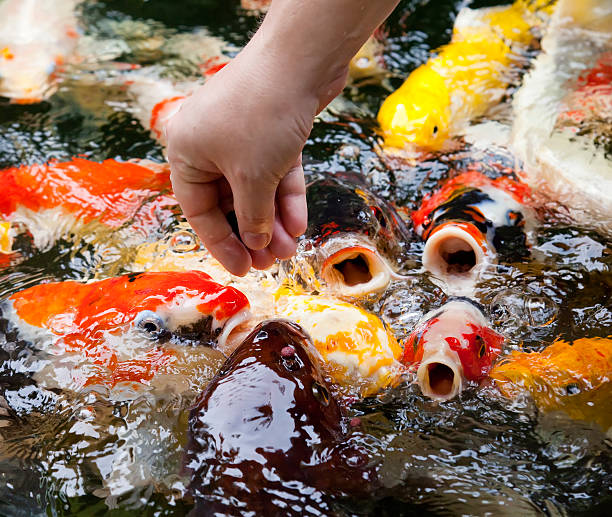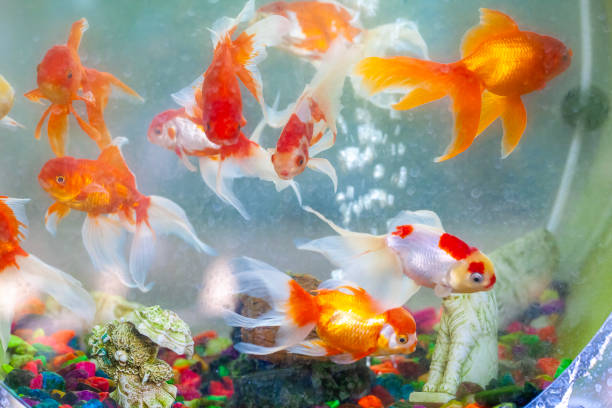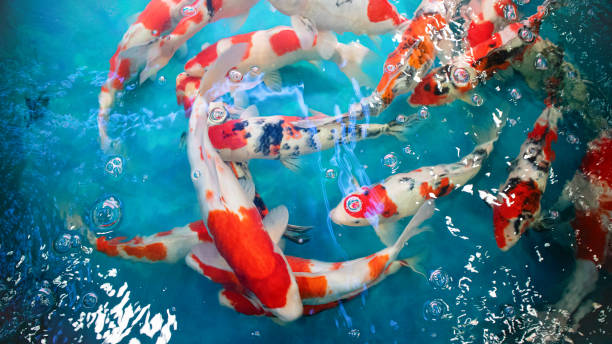Koi fish are one of the most popular ornamental fish for ponds, known for their vibrant colors and peaceful nature. But a common question among koi owners is: Do koi fish eat other fish? The short answer is sometimes, but not intentionally. Their diet primarily consists of plant matter, insects, and small invertebrates, but under certain conditions, koi may end up eating smaller fish. Let’s explore their diet, what influences their eating habits, and how to prevent unwanted predation in your pond.
Understanding the Natural Diet of Koi Fish
Koi fish are omnivores, meaning they eat both plant and animal-based food. Their diet in the wild or in a pond typically includes:
- Algae and plant matter – Koi love nibbling on aquatic plants, algae, and even fallen leaves.
- Insects and larvae – Small bugs, mosquito larvae, and worms are part of their natural diet.
- Crustaceans and small aquatic creatures – Snails, tiny shrimp, and other invertebrates.
- Pellets and commercial koi food – Specially formulated koi food ensures they get proper nutrition.
- Fruits and vegetables – Koi enjoy treats like lettuce, watermelon, and peas.
Unlike aggressive fish species, koi don’t have a natural instinct to hunt or chase other fish. However, there are scenarios where they might end up eating smaller fish.

Do Koi Fish Eat Other Fish? When Does It Happen?
While koi fish are not predators, there are situations where they may eat other fish in the pond:
1. Mistaking Tiny Fish for Food
If you introduce very small fish, such as baby guppies or tiny fry, koi might mistake them for insects or small crustaceans and accidentally eat them. Koi do not actively hunt other fish, but if the opportunity presents itself, they may consume them.
2. Lack of Food
If koi are underfed or not receiving enough nutrients, they may start nibbling at anything available. This includes smaller fish that fit into their mouths. Proper feeding ensures koi don’t resort to eating tank or pond mates.
3. Territorial Behavior & Space Issues
Koi fish are generally peaceful, but overcrowding can cause stress, leading them to become aggressive. If a pond is too small or has too many fish, koi may start attacking weaker fish, which sometimes results in accidental consumption.
4. Competition for Food
If there are other small fish in the pond that are slow eaters or struggle to find food, koi may outcompete them, leaving them weak and vulnerable. In some cases, koi may nip at smaller fish out of dominance, especially during feeding time.
5. Breeding & Eggs Consumption
Koi will eat fish eggs, including their own. If you have a pond with koi and other fish that lay eggs, chances are the koi will eat them before they hatch. This is not aggressive behavior but rather an instinct to consume protein-rich food.
How to Prevent Koi from Eating Other Fish
If you want to maintain a mixed-species pond and prevent koi from eating smaller fish, here are a few tips:
1. Choose Compatible Tank Mates
If you’re adding other fish to your pond, pick species that are large enough to not fit into a koi’s mouth. Some good choices include:
- Goldfish (same size as koi)
- Plecos
- Sturgeon
- Catfish
- Loaches
Avoid adding fish that are much smaller, such as guppies, small tetras, or baby fry, as they can easily become a meal for koi.
2. Feed Your Koi Properly
Make sure your koi have a nutrient-rich diet with a mix of high-quality pellets, vegetables, and protein sources like shrimp or worms. Feeding them 2-3 times a day reduces the likelihood of them turning to smaller fish for food.
3. Provide Hiding Spots for Small Fish
Adding rocks, plants, and caves in the pond can give smaller fish a place to hide if they feel threatened. Dense vegetation helps them stay safe while allowing koi to swim freely without aggression.
4. Avoid Overcrowding
Ensure that your pond is large enough to accommodate all the fish comfortably. A minimum of 1,000 gallons is recommended for a few koi, and adding more fish requires additional space. Overcrowding increases stress and aggression, making koi more likely to attack weaker fish.
5. Separate Breeding Fish
If you have fish that lay eggs and don’t want them to be eaten, consider moving them to a separate breeding tank or pond until the fry grow large enough to be introduced back.
Can Koi Live with Other Fish?
Yes! Koi fish can coexist with other fish as long as they are of similar size and have enough space. The key is to avoid very small fish that fit into their mouths and to ensure all fish in the pond get enough food.
Some great pond companions for koi include:
✅ Goldfish
✅ Plecos
✅ Catfish
✅ Sturgeon
✅ Orfe
Avoid small species like guppies, neon tetras, or fish fry, as they may become accidental food for koi.

Final Thoughts: Should You Worry About Koi Eating Other Fish?
Koi fish are not natural predators, and they do not actively hunt or attack other fish. However, in certain situations—such as mistaken identity, overcrowding, or lack of food—they might eat smaller fish.
If you want a diverse pond with koi and other fish, pick the right companions, provide plenty of food, and create hiding spots for smaller fish. This will ensure a peaceful, thriving pond where all fish can coexist without worry.
Have a question about koi care? Drop a comment below! 🐠💦




